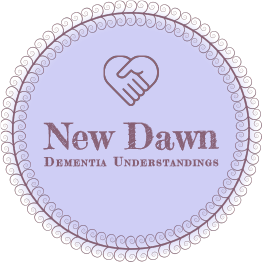PLEASE LET US NOT FORGET…
We hear a lot about the forgetfulness of those living with Dementia. Yes, it is true that Dementia may affect some portions of memory, but it seems we’ve become a bit forgetful ourselves when it comes to our interactions with those living with Dementia.
Often the children of those living with Dementia feel at a loss when their parent experiences a loss of verbal skills and feels challenged with conversation. This feeling of loss can be compounded if they no longer have an outward recognition of your relationship to them. Hearts are broken when a parent cannot recall an adult child’s name. This often leads to a feeling that there is no way to continue to share and grow what has always been a cherished relationship. Here is where we, ourselves, become forgetful.
Before we mourn the loss of a relationship take a step back and think about how that relationship began. When you were a baby did you know your parents’ names or their relation to you? Were you able to have what one might consider a “normal conversation” with your Mom and Dad when you were a few months old? I’m going to bet the answer to both questions is “no”. Yet, a loving relationship took root and grew…without words, but with love, tenderness, care, and trust. Maybe you came to associate the scent of mom’s favorite soap or dad’s aftershave with comfort. Though your parents may have chattered on to you, you couldn’t comprehend their sounds and their meaning. Your own communication at that time was limited to crying out when needs needed to be met, as your verbal skills were yet to be discovered. You couldn’t verbalize “mommy I’m hungry; daddy please change me”, yet as parents they instinctually provided for that need. In this situation human need triggered their human response, IE: Determine the nature of the need and take appropriate steps to fulfill that need. We sometimes forget our own natural ability to do this. Please let’s not forget this.
As with the child who feels “abandoned” by their parent’s Dementia, spouses may also feel a relationship is at an end when words and conversation are a challenge . May I ask, never in those 60+ years did you and your spouse not sit in companionable silence? Did you never hold hands without words, or give an affirmative nod to your spouse to communicate your support? Perhaps serve up a bowl of chicken soup to sooth the soul? Please let’s not forget this.
Your friend of 50 years has no idea who you are now. You feel you cannot communicate with them and your relationship is lost. Not once in 50 years did you place a supportive hand on their shoulder when words would have been an insult to the gravity of the situation they were facing…bring food without fanfare, or just sit with them through troubled times? Did they offer a smile and a nod of thanks without words? Please don’t forget this.
We allow ourselves to become frustrated because a PWD in our care continually wants to stand up from their chair. We label them a “fall risk”. Have we never completed a long drive to visit family or friends and declined their offer of a comfortable chair upon our arrival, saying “Thanks but I need to stand for a few minutes; I’ve been sitting in the car for hours”? Your muscle memory was reminding you that sitting for too long wasn’t natural and your natural instinct was to stand and stretch. Persons living with Dementia do not lose their natural human instincts. Muscle Memory remains long after Factual Memory may fade. They need to stand and stretch just like the rest of us. Please let’s not forget this. Perhaps they truly are unable to stand, even with assistance. Please let’s not forget that this can happen to anyone who has experienced physical trauma affecting their strength and mobility. In the case of those without Dementia who are facing this challenge we bring in Physical Therapy and work out a plan to meet these challenges through chair exercises and the like. In the case of those living with Dementia we place them on 15 minute checks to ensure that their natural human instincts do not prevail. In the example of those challenged by a disability other than Dementia we’ve taken a step toward helping them manage their challenges of immobility. In the latter example we’ve solved nothing except our own challenge of keeping our fall rates down. Let’s not forget that we need to focus on solving their problems, not our own.
If we are seeing only the symptoms of Dementia and not seeing the human being challenged by those symptoms, then yes it will be difficult to maintain and grow our relationship with them. After all we cannot have a relationship with a collection of symptoms. A relationship with a human being experiencing those symptoms is possible and feasible when we see past the challenges and recognize the person we’ve always known. Dementia hasn’t taken away your parent, spouse, or friend. It may have taken away the “convenience” of a conventional relationship, but life, love and happiness are an ever changing dynamic in any relationship. Grow from there.
